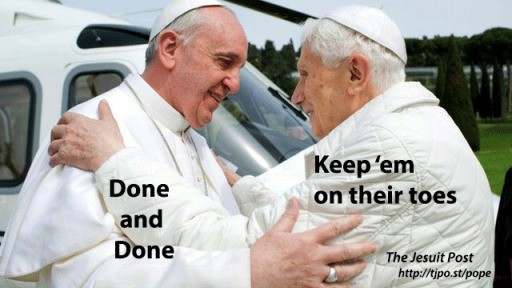| This post is part of a series of reflections by TJP writers on Pope Francis’s recent interview. Full Series List: The Papal Interview: Young Jesuits React and Reflect The Original Interview: At America Magazine |
We regularly post “Worth Reading” pieces, but this is the first time we’re posting a link to a piece that is a “Must Read”: a long and fascinating interview with Pope Francis.
So — here’s the full interview posted at America. Or here’s the interview posted at Thinking Faith, the British Jesuits’ magazine. Pope Francis was interviewed by Antonio Spadaro, SJ, the editor of La Civiltà Cattolica, and the interview is being jointly published by a number of Jesuit publications in different languages.
This is must-read not just because it’s a significant, very frank interview with a sitting pontiff. Actually, that’s happened before; Pope Benedict gave some wide-ranging (in fact, book-length) interviews.
The interview is also a must-read because as the world is still trying to figure out who Pope Francis is, and what his more approachable and informal style means for the Church, it’s becoming more and more clear that we can’t analyze this pope in soundbites — a point we’ve already made once here at TJP. We have to go to the source, and read what he actually said.
PSA: Quick summaries of #PopeFrancis interview can’t capture depth and nuance. Go 2 source http://t.co/Kslk1dXaCh @americamag #LongReads
— The Jesuit Post (@TheJesuitPost) September 19, 2013
Yes, this interview has soundbites, and some of those soundbites have words that invite a predictable media furor. The New York Times headline about the interview, as we write this piece, is “Pope Bluntly Faults Church’s Focus on Gays and Abortion.” Does the pope say something about this in the interview? Yes. Is that what the interview is about? No — it is a whole lot more complicated, and much, much more interesting than that.
So what we’ve done is asked the TJP staff to find some of the quotes they think are most interesting and offer a tiny bit of context. We’ve focused on four issues below: Francis’s style of decision-making and consultation, doubt and certainty in religious belief, the role of women in the church, and the “hot-button” issues which led to the headline referenced above.
We’re also asking you, our readers, to suggest in the comments, or via social media, what parts of the interview you’re most interested in, or think need more explanation. We’re getting to work on some more in-depth reaction and analysis in response to the interview, but those will require a bit more time, and a lot more prayer. We’ll be putting those pieces up over the next few days.
Before the quotes, then, here’s the link to the full interview one more time. Read the whole thing.
***
On what he learned from his time as provinicial superior of the Jesuits in Argentina:
In my experience as superior in the Society, to be honest, I have not always behaved in that way—that is, I did not always do the necessary consultation. And this was not a good thing. My style of government as a Jesuit at the beginning had many faults. … My authoritarian and quick manner of making decisions led me to have serious problems and to be accused of being ultraconservative … but I have never been a right-winger. It was my authoritarian way of making decisions that created problems.
Jesuit provincials have a group of appointed consultors, whose advice they are supposed to hear on major decisions — and Francis speaks in the interview about learning (through failure to use it well) how important consultation is. He connects this lesson to his current use of consultation, such as the advisory group of eight cardinals, saying that such efforts need to take a “less rigid form,” and that he wants these to be real rather than token consultations.
***
On the place of doubt in religious belief:
If one has the answers to all the questions, that is the proof that God is not with him. It means that he is a false prophet using religion for himself. The great leaders of the people of God, like Moses, have always left room for doubt. You must leave room for the Lord, not for our certainties; we must be humble.
And what he is certain about:
Those who today always look for disciplinarian solutions, those who long for an exaggerated doctrinal ‘security,’ those who stubbornly try to recover a past that no longer exists—they have a static and inward-directed view of things. In this way, faith becomes an ideology among other ideologies. I have a dogmatic certainty: God is in every person’s life. God is in everyone’s life.
The willingness to risk the false “security” of having everything already settled has clearly been a recurring theme in the first months of Francis’ papacy. But this does not mean that Francis is advocating a do-it-yourself, anything-goes approach to religion — he has “dogmatic certainty,” as he says, about God being very directly involved. Rather, he’s pointing out that a mature, firm, and confident faith doesn’t hide in self-certainty.
***
On the role of women in the Church:
Women are asking deep questions that must be addressed. The church cannot be herself without the woman and her role. The woman is essential for the church. Mary, a woman, is more important than the bishops. I say this because we must not confuse the function with the dignity. We must therefore investigate further the role of women in the church. We have to work harder to develop a profound theology of the woman. Only by making this step will it be possible to better reflect on their function within the church. The feminine genius is needed wherever we make important decisions. The challenge today is this: to think about the specific place of women also in those places where the authority of the church is exercised for various areas of the church.
This section of the interview, which echoes comments in Francis’s post-WYD in-flight press conference, will, we expect, be met with mixed reactions. On the one hand, he clearly acknowledges that the Church has to think about the place of women relative to the exercise of authority in the Church. However, he also focuses on Mary as an example of the role of women, which has often been connected to a too-narrow focus on motherhood as defining women, and distinguishes between function and dignity, which echoes language that has often been used to dismiss the need he speaks of later in the quote to think about how women can be in the places where the authority of the Church is exercised.
***
On the “hot-button” issues:
We cannot insist only on issues related to abortion, gay marriage and the use of contraceptive methods. This is not possible. I have not spoken much about these things, and I was reprimanded for that. But when we speak about these issues, we have to talk about them in a context. The teaching of the church, for that matter, is clear and I am a son of the church, but it is not necessary to talk about these issues all the time.
Read in context — and here, perhaps even more than elsewhere in the interview, the context is vital — Francis is talking about how the Church must speak in order to proclaim the message of God’s salvation to the world. He talks about how that proclamation must first of all provoke fascination and attraction and make hearts burn, rather than becoming “obsessed with the transmission of a disjointed multitude of doctrines to be imposed insistently.” He’s not changing any teaching — he’s saying that unless we first proclaim the saving love and mercy of God and help people become convinced of that, none of these other teachings can be properly heard at all.
***
So once more: read the whole thing. And then jump into the comments here, or via Twitter and Facebook, to tell us what pieces of the interview you’re spending time with, or what needs further explanation and context. We’ll be back soon with more in-depth analysis and reflection from the contributors here at TJP, and we’ll try to post some links to other good analysis of the interview on the web.
UPDATES:
- Discerning the Papal Interview — Eric Sundrup on how to read the interview in the Ignatian tradition, avoiding quick soundbites



